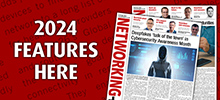08 October 2020

Andrea Babbs, country manager and head of sales for VIPRE Security
With many businesses having to overhaul their operations overnight to enable their staff to work from home due to Covid-19, maintaining as close to business as usual was an absolute priority. But in the rush to implement collaboration tools to get employees up and running for business continuity, cyber security was pushed further down the list of priorities, potentially putting organisational data at significant risk.
Many businesses may have already had some level of cyber security protection in place, but the shift in working environments and practices means that the emphasis on data security must be reinforced. Some IT security leaders have seen a 30,000% increase in Covid-19 themed attacks, as cyber-criminals continue to use the current global crisis as an opportunity to target potentially vulnerable end-user systems. With a de-centralised workforce, there is an even greater need for employees to take responsibility for keeping sensitive company information secure, and not just rely on security software to assume the role of data guardian.
Harder, better, faster
While the transition to remote and flexible working has been implemented gradually across many organisations over the years, the overnight change triggered by government protocol has had a dramatic impact on employee working practices. With no peer review or easy access to conversational questions to quickly ask: “does this email look strange to you?”, employees are potentially at increased risk of falling foul of phishing scams.
Add to this the heightened pressures of staff feeling the need to work harder, faster, for longer and demonstrate how much they are actually working when at home, it’s no surprise that mistakes are made. For example, responding to emails immediately rather than taking the time to stop and think whether the email is actually genuine, or giving out sensitive information over the phone to be seen as helpful during a difficult and stressful time.
Reinforcing responsibility
With tools to support employees that reinforce the need to think before they press send on an email, and consider whether it is authentic or not, employees can assume some of the responsibility for keeping data secure. And as 53% of data breaches are classified as insider, clearly the workforce has a critical role to play in an organisation’s cyber defence strategy.
Businesses can support employees to avoid commonly made mistakes such as forgetting to attach a document when you wrote that you had, or sending misaddressed emails or attaching incorrect information by deploying technology such as VIPRE’s Safe Send which provides a simple safety check. This provides the user with a prompt prior to any email being sent, reminding employees to double check and confirm the addressee and what has been attached. Parameters can also be set to add certain domains to an allow list, or the solution can be deployed on a department or user basis. For example, financial data is highly sensitive, so may require confirmation for all emails, but another department may only need checks on external emails.
Certain keywords can also be defined, so when those keywords are identified within an email – an unreleased new product name, for example – an additional confirmation is prompted before the email is sent, allowing for that all important double check that the right person is being sent the right information.
Technology provides a vital piece of the cyber security puzzle through high quality layered protection that covers email security, web and end-point protection. As the threat landscape is arguably evolving at a faster rate than ever before, coupled with the workplace shifting to a new normal – these tools have never been more critical.
Focusing on the user is also key, educating them and empowering them to take some responsibility for data security, supported by innovative software – not just relying on the IT department. Those that adopt such an approach will be far more successful than those that rely on technology in isolation.
The race to normality
In the rush to keep ‘business as usual’ during such uncertain times, businesses may have inadvertently made their security infrastructure vulnerable to data breach – be that from external threats or accidental insider data leakage. As we slowly make the transition from home working to moving back to the office, or transforming to a hybrid workforce, security needs to be reinforced yet again, with a combination of reminders, prompts and continuous training.
Employees are a vital tool in a business’ arsenal, so they must be regularly trained and reminded about how they can stay one step ahead of cyber threats. But it’s human nature to make mistakes and as such, employees must be appropriately supported with intuitive technology that can spot anomalies, errors and factors that fall outside of set parameters to highlight where potential threats, scams and faults are about to take place.
Transitioning to secure remote working during and beyond Covid-19
Organisations of all sizes that typically work in office environments have been thrown into the deep end due to the Covid-19 outbreak. Social distancing measures and restricting unnecessary travel has meant that a majority of companies had to unexpectedly revert to remote working. Many of these businesses quickly realised that they weren’t ready for this digital transformation, with recent research suggesting that UK firms are among the world’s least prepared for home-working.
With 25% of businesses having no crisis plan in place and 55% of employees having little to no experience of working from home, organisations have had to revise their working practices to be able to conduct their work digitally and remain effective. Technology plays a key role in enabling remote work, but many organisations did not have this planned in advance, and subsequently, are at a disadvantage due to their current inadequate technology solutions and infrastructure in place. This can lead to significantly increased security risks and concerns, as Steve Law, CTO, Giacom and Sébastien Gest, VadeSecure, explain.
Workplace challenges
Workforces may not have access to the necessary devices from their homes such as work laptops, the correct video conference solutions or collaboration tools in place to perform their role. As a result, employees who are working from home will have to do so from their own devices. This ‘Bring Your Own Device’ (BYOD) phenomenon creates a security concern as not all personal electronic devices will have the correct level of security installed on them – the software may not be up to date, they may have an older version of Windows installed or no antivirus software available.
This creates an issue for both the consumer and the professional, as the same credentials are often used across multiple accounts at the same time. Hackers’ creativity is limitless and is becoming more sophisticated over time. Vade Secure has seen a shift in cyber criminals’ strategies, changing from attacking individuals with ransomware to instead using these individuals as a backdoor to gain access to corporate networks, and there is no better opportunity to do this than via individuals using their personal devices from home. However, by implementing the correct software and security solutions across all employees’ devices, these risks can be mitigated.
Evolving threats
The number of cyberattacks has continued to increase over time, with up to 88% of UK companies being targets of breaches in the last 12 months. However, hackers are taking advantage of the current coronavirus situation by sending phishing emails purporting to be PPE suppliers or medication. Recent statistics have found that since January 2020, there have been over 4,000 coronavirus-related domains registered globally, with 3% found to be malicious and 5% suspicious. These results heighten the importance of ensuring your workforce are securely remote working.
Over the last three months, as the coronavirus outbreak has unfolded, Vade Secure has seen a surge in spear-phishing and malware activities. Examples of this which have been found include capitalising on psychological aspects of the victims, including Covid-19 charity campaigns, fake mask and sanitiser suppliers, as well as stock and medications for purchases which don’t exist.
With 91% of cyber attacks using emails as their first vector, it’s more important than ever to ensure that your employees have a secure email network in place. No organisation is immune to the threat and companies which don’t have the right security software in place need to act now before it’s too late. By adding these security elements, companies can benefit from detecting and blocking features and using Artificial Intelligence to secure their networks and become notified when a non-legitimate email appears.
Securing the weakest link
Often, the weakest link of an organisation is the employee, as 88% of UK data breaches are caused by human error. Employees are not security experts and can fall foul to phishing scams if they don’t have the right level of education or awareness. When working from home, your workforce is under more pressure to work both faster and harder, which can lead to mistakes being made. Staff members don’t have the time to check every email before they open them, but this one click can make all the difference.
Instead, by educating employees and making them more vigilant, they will be able to spot scams and cyber attacks before the damage is done. Combined with the right security software that uses techniques such as alert ‘pop-ups’ to prompt users to check emails before clicking on links, for example, the workforce will become more aware of the signs to look out for. By enabling users to make an informed decision about the nature and legitimacy of their email before acting on it, organisations can now mitigate against this high-risk area.
Conclusion
In order for organisations to limit the number of insider data and security breaches, particularly when working remotely, it’s crucial for employees to understand the role they play in keeping the company’s information secure. By preparing in advance and having a secure contingency plan in place which provides employees with the necessary devices and security, companies will be in a stronger position to defend their systems against hackers. In addition to this, supporting employees with training will allow workforces to understand the evolving risks they face, and how to keep their information and systems secure.










